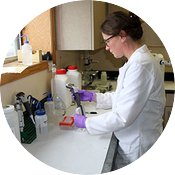Nutrient management research at the SWROC focuses on the interactions between soil fertility and microbial activity and how these interactions affect crop growth and yield. Our projects study both conventional and organic cropping and horticultural systems to improve nutrient management practices and crop nutrient use efficiency while minimizing environmental effects.
Our work primarily focuses on trying to develop a better understanding of how carbon, nitrogen, phosphorus and sulfur affects microbial activity, and as a result, nutrient cycling. In order to develop a true sustainable food production system, the dependency on industrial chemical fertilizers and pesticides must be drastically reduced compared with today’s requirements. Reducing fertilizer application to fields will cause a deficit which will need to be balanced out otherwise crop growth and yield will be compromised. Microbes in the soil are the key to overcome this deficit. Our current work on nutrient management has been focused on finding how to use management practices to improve microbial cycling of nutrients and improve soil nutrient availability to crops.
Current projects are:
- Assessing the amounts of nutrients in rain and snow fall - We’re assessing whether the increased rain and snow fall in Minnesota in recent years has increased the atmospheric deposition of nitrogen across the state and what its impacts are. Recent monitoring has suggested that the increased amount of precipitation combined with the increased number of animals grown for food have the potential to supply as much as 30 lbs of N per acre on a yearly basis. Recent studies on N rate have also shown that lower amounts of N are being needed to achieve a positive crop response to added N, which could a result of increased atmospheric deposition of N. We’re monitoring atmospheric deposition of N to assess whether growers can adjust their N applications in response to an increase in N available from precipitation.
- Providing new tools to fruit and vegetable growers - We’re working with the Agricultural Utilization Research Institute to develop a biodegradable material to replace the petroleum-based plastic films commonly used in fruit and vegetable production in Minnesota. The goal is to provide an alternative that provides the plant growth and yield benefits of plastic covers but can also be incorporated into the soil at the end of the growing season to provide carbon for microorganisms as well as other nutrients for plants during following growing seasons while the product decomposes.

